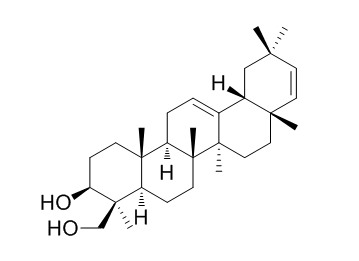Soyasapogenol C
Reference standards.
Inquire / Order:
manager@chemfaces.com
Technical Inquiries:
service@chemfaces.com
Tel:
+86-27-84237783
Fax:
+86-27-84254680
Address:
1 Building, No. 83, CheCheng Rd., Wuhan Economic and Technological Development Zone, Wuhan, Hubei 430056, PRC
Providing storage is as stated on the product vial and the vial is kept tightly sealed, the product can be stored for up to
24 months(2-8C).
Wherever possible, you should prepare and use solutions on the same day. However, if you need to make up stock solutions in advance, we recommend that you store the solution as aliquots in tightly sealed vials at -20C. Generally, these will be useable for up to two weeks. Before use, and prior to opening the vial we recommend that you allow your product to equilibrate to room temperature for at least 1 hour.
Need more advice on solubility, usage and handling? Please email to: service@chemfaces.com
The packaging of the product may have turned upside down during transportation, resulting in the natural compounds adhering to the neck or cap of the vial. take the vial out of its packaging and gently shake to let the compounds fall to the bottom of the vial. for liquid products, centrifuge at 200-500 RPM to gather the liquid at the bottom of the vial. try to avoid loss or contamination during handling.
J Appl Toxicol.2020, 40(7):965-978.
J Mol Med (Berl).2018, 96(7):661-672
Sci Rep.2018, 8:9267
Journal of Functional Foods2017, 30:30-38
Food Science&Tech. Res.2022, 28(2):123-132.
Nat Prod Sci.2018, 24(3):206
Research Square2023, 2883170.
Phytomedicine.2022, 110:154597.
mBio.2020, 11(3):e00686-20.
Evid Based Complement Alternat Med.2017, 2017:6360836
Related and Featured Products
Pharmaceutical Biology, 2008, 22(1):1-10.
Lipids and Saponins of Phaseolus coccineus.[Reference:
WebLink]
The lipids obtained from the roots, rhizomes and stems of Phaseolus coccineus were separated into saponifiable and unsaponifiable fractions.
METHODS AND RESULTS:
Analysis of the saponifiable fraction by gas-liquid chromatography (GLC) of the methyl esters showed the presence of a series of C8 to C18 saturated acids and C12 to C18 unsaturated acids. Oleic acid was the predominant fatty acid detected in the roots (22.3%) and rhizomes (34.4%). However, in the stems palmitic acid (30.0%) was the major component. Stearic acid, which was present in a fairly high concentration in the rhizomes, was not detected in either the roots or the stems. β-Bergamotane, 18α-oleanan-3-one and β-Sitosterol have been isolated from the roots, rhizomes and stems of unsaponifiable fraction. In all these three plant materials, the presence of saponins was also revealed. Two sapogenins were isolated from the roots and were identified as Soyasapogenol C and Ursa-12,15-diene-3,24-diol. Soyasapogenol C was also isolated from the rhizomes and the stems. In addition, soyasapogenol B was also isolated and identified in the stems.
CONCLUSIONS:
The compounds were identified by TLC, UV, IR, NMR and mass spectral methods. The sugar moieties associated with these sapogenins were identified as D-glucose, D-fructose, L(+)-arabinose, L(+)-rhamnose and D-galacturonic acid.



